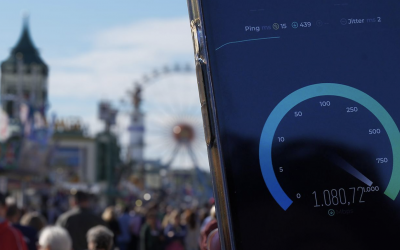DATA REVERSE® at GPEC digital 2025
GPEC digital 2025 in Leipzig has once again impressively demonstrated how essential IT forensics and professional data recovery are in today’s security landscape, which is characterised by highly developed cyber attacks. Public institutions, the police, the judiciary and operators of critical infrastructures in particular are faced with the challenge of not only taking preventive action with sophisticated IT security mechanisms, but also being able to access lost or compromised data quickly and reliably in an emergency.
With over 20 years of experience and a team of experts trained in forensics, the Leipzig-based data recovery company DATA REVERSE® presented itself at the trade fair as a strategic partner for modern security architectures. Using practical examples – from defective RAID systems to compromised NAS structures and virtualised infrastructures – the company illustrated that data recovery has long been more than just a technical response. It is an integral part of a comprehensive emergency process that is essential as a back-up for smooth continued operation in times of crisis.
The increasing complexity of the threat situation, for example through targeted ransomware attacks or so-called ‘sleeping viruses’, makes it essential to involve an external contact for data recovery in strategic resilience planning. For critical infrastructure institutions that already have their own IT forensics departments, this step is a crucial component for being able to activate defined recovery processes and reliable partner networks in an emergency. In particular, the upcoming transposition of the NIS 2 Directive into German law emphasises the need for data recovery to be operationally integrated into the incident response process – planned, documented and regularly tested.
Jan Bindig, CEO of DATA REVERSE®, sums it up concisely: ‘In the public administration environment, we often find in practice that although backups do exist, they do not work reliably in an emergency. What is missing are defined processes, clear points of contact and recovery capacities that can be activated in the event of a crisis.’ This assessment reflects the increasing demand for robust IT resilience that not only relies on preventive measures but also guarantees fast and certified recovery options in an emergency.
GPEC digital 2025 provided clear signals from the critical infrastructure sector: the integration of external experts in IT forensics, data recovery and strategic consulting is increasingly becoming an indispensable component in holistic incident response strategies. DATA REVERSE® was able to engage in intensive discussions with decision-makers, IT managers and consultants at the trade fair – conversations that impressively demonstrate that the point of contact in an IT emergency should be known even before a crisis occurs.
With a comprehensive portfolio ranging from professional data recovery and RAID analysis to support in the recovery of sensitive data, DATA REVERSE® is positioning itself as a strategic partner for authorities and critical infrastructure facilities. At a time when digital resilience is no longer just a question of technology, but a crucial part of the security architecture, the company offers the expertise needed to act quickly and in compliance with the GDPR in an emergency.
For more information about DATA REVERSE® and its services, visit the company’s website (https://www.datareverse-datenrettung.de). The accompanying video also provides an insight into how the company works (Video in German language): https://youtu.be/E7yTtyTJznI.



